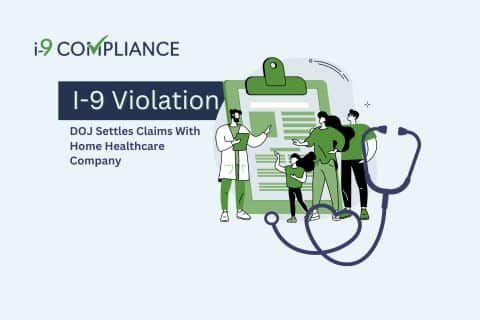DOJ Settles Claims of I-9 Violations With Home Healthcare Company

The Department of Justice (DOJ) announced that it reached an agreement to settle allegations against a home healthcare provider. According to the settlement, the provider discriminated against foreign national workers in the employment eligibility verification (Form I-9) process. The DOJ claimed that the employer violated the Immigration and Nationality Act (INA) during this process.
One violation involved the rejection of a non-U.S. citizen’s valid work documentation. According to the case, the worker’s documents proved her permission to work. The DOJ also addressed how the company required the lawful permanent resident to provide continued authorization to work, which the INA deemed unnecessary.
This investigation responded to a complaint about denied employment. According to the complaint, the rejection stemmed from the documents they submitted to prove their employment authorization. The company allegedly rejected the documents because the last name differed from the driver’s license and Social Security card included.
The DOJ discovered that the violations occurred despite the employer accepting U.S. passports from U.S. citizens with similar surname discrepancies. Furthermore, the DOJ stressed that the documents presented by the U.S. and non-U.S. citizens qualified under the I-9 process. As such, the investigation confirmed the complaint’s validity.
The DOJ also found reasonable cause to believe that the employer had engaged in a further pattern of unfair documentary practices violating the INA. The investigation revealed that the violations occurred from January 2021 through March 2023. This pattern included the employer requiring reverification of permanent resident cards presented by lawful permanent residents. According to the DOJ, I-9 regulations do not require this practice.
When announcing the settlement, Assistant Attorney General Kristen Clarke of the DOJ’s Civil Rights Division stated, “Employers cannot treat employees differently based on their citizenship status when verifying their permission to work. The department is committed to ensuring that employers do not deny workers equal treatment in the workplace, whether in hiring, checking employees’ permission to work, or otherwise.”
The employer must pay the U.S. government a $7,488 civil penalty and provide the affected worker with $1,750 in lost wages. The settlement also requires the employer to update its policies to prevent unnecessary I-9 reverification and ensure compliance with federal laws. Finally, the employer must provide relevant personnel with training on the I-9 process. This training must include addressing documents with a different name from the one entered in Section 1 of the Form I-9.
HR personnel may struggle to understand the intricacies of Form I-9. One way to ensure compliance is to incorporate a trusted electronic I-9 management system into the onboarding and reverification process. This system can guide employers’ personnel through every step, provide convenient electronic storage for all forms and documentation, and include an optional E-Verify integration.
Ensure compliance today by switching to an electronic I-9 management tool with I-9Compliance.